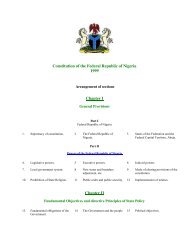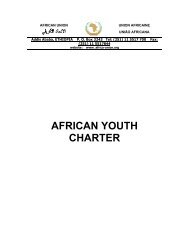Economic Recovery Growth Plan (ERGP) 2017-2020
This Medium Term Plan of the Federal Republic of Nigeria was designed to tackle the huge decline in the country’s economy since her shift from agriculture sector to crude oil and gas sector in the late 1960s. The plan’s objective includes restoring growth, investing in citizens and building a globally competitive economy.
This Medium Term Plan of the Federal Republic of Nigeria was designed to tackle the huge decline in the country’s economy since her shift from agriculture sector to crude oil and gas sector in the late 1960s. The plan’s objective includes restoring growth, investing in citizens and building a globally competitive economy.
Create successful ePaper yourself
Turn your PDF publications into a flip-book with our unique Google optimized e-Paper software.
entrepreneurial nature of Nigerians, from the MSMEs to the large domestic and multinational<br />
corporations to achieve the objectives of this <strong>Plan</strong>. The <strong>Plan</strong> prioritizes the provision of a more business<br />
friendly economic environment.<br />
Promote national cohesion and social inclusion. Nigerians are the ultimate beneficiaries of more<br />
inclusive growth and therefore, the initiatives set out in this <strong>Plan</strong> are aimed at ensuring social inclusion<br />
and the strengthening of national cohesion.<br />
Allow markets to function. The <strong>ERGP</strong> recognizes the power of markets to drive optimal behaviour<br />
among market participants. The <strong>Plan</strong> prioritises the use of the market as a means of resource allocation,<br />
where appropriate. However, the <strong>Plan</strong> also recognises the need to strengthen regulatory oversight to<br />
minimise market abuse.<br />
Uphold core values. The <strong>ERGP</strong> is rooted in the core values that define the Nigerian society as<br />
enshrined in the 1999 Constitution, notably discipline, integrity, dignity of labour, social justice, religious<br />
tolerance, self-reliance and patriotism. It requires all citizens and stakeholders to adhere to these<br />
principles.<br />
1.3 <strong>ERGP</strong>’S New Approach<br />
The <strong>ERGP</strong> differs from previous plans in several ways. First, focused implementation is at the core of the<br />
delivery strategy of the <strong>Plan</strong> over the next four years. More than ever before, there is a strong political<br />
determination, commitment and will at the highest level. Whilst all the MDAs will have their different<br />
roles in implementing the <strong>Plan</strong>, a Delivery Unit is being established in the Presidency to drive the<br />
implementation of key <strong>ERGP</strong> priorities. The Ministry of Budget and National <strong>Plan</strong>ning will coordinate<br />
plan-implementation and for this purpose will, amongst other things, build up its capability for robust<br />
monitoring and evaluation.<br />
Second, the <strong>Plan</strong> outlines bold new initiatives such as ramping up oil production to 2.5mbpd by <strong>2020</strong>,<br />
privatizing selected public enterprises/assets, and revamping local refineries to reduce petroleum product<br />
imports by 60 percent by 2018. Other initiatives include environmental restoration projects in the Niger<br />
Delta, which demonstrate the Federal Government’s determination to bring environment sustainability to<br />
the forefront of its policies. As part of this <strong>Plan</strong>, oil revenues will be used to develop and diversify the<br />
economy, not just sustain consumption as was done in the past. The economy will run on multiple engines<br />
of growth, not just the single engine of oil. The <strong>Plan</strong> focuses on growth, not just for its own sake, but for<br />
the benefits it will bring to the Nigerian people. This <strong>Plan</strong> also places importance on emerging sectors like<br />
the entertainment and creative industries.<br />
Third, the <strong>ERGP</strong> builds on existing sectoral strategies and plans such as the National Industrial<br />
Revolution <strong>Plan</strong>, and the Nigeria Integrated Infrastructure Master <strong>Plan</strong>. Rather than re-inventing the<br />
wheel, the <strong>ERGP</strong> will strengthen the successful components of these previous strategies and plans while<br />
addressing challenges observed in their implementation.<br />
Fourth, the <strong>ERGP</strong> is innovative in that it signals a changing relationship between the public and private<br />
sectors based on close partnership. In implementing the <strong>Plan</strong>, the Government will collaborate closely<br />
with businesses to deepen their investments in the agriculture, power, manufacturing, solid minerals and<br />
services sectors, and support the private sector to become the engine of national growth and development.<br />
In addition, science and technology will be effectively harnessed to drive national competitiveness,<br />
productivity and economic activities in all sectors.<br />
Fifth, the current Administration has merged the Budget and <strong>Plan</strong>ning functions into one Ministry to<br />
create a better and stronger link between annual budgets and the <strong>ERGP</strong>. This has facilitated the <strong>ERGP</strong>’s<br />
preparation process and will also expedite its implementation. It also strengthens the macro framework<br />
which underpins the <strong>ERGP</strong>, ensuring that budgets are properly aligned with planning, thus promoting<br />
effective implementation.<br />
26





